COVID-19 shows how reckless Jordan Valley annexation would be
By: Jordan River Waterkeeper

The extensive cooperation between Israeli and Palestinian health professionals would halt if an annexation policy were advanced in the midst of this health crisis
By Gidon Bromberg, Yana Abu Taleb, and Nada Majdalani, co-directors of EcoPeace Middle East and Jordan River Waterkeepers in Israel, Jordan, and Palestine. Originally published in The Times of Israel, republished with permission.
“Cutting off the nose to spite the face” is an apt expression to describe the lack of rationale behind Israeli government policies calling for unilateral annexation of areas of the West Bank and in particular the Jordan Valley. At a time when cross-border cooperation is more essential than ever to promote public health, this populist call threatens regional and national security interests.
EcoPeace Middle East prepared the first regional integrated master plan for the Jordan Valley in 2015. The document highlights the essential nature of the Jordan Valley for Palestinian prosperity. For the Palestinians, the Jordan Valley is comparable to what Ben Gurion saw in the Negev for a pre-state Israel. The valley is at present the breadbasket for Palestinian food security and has the potential for a large-scale food export economy. Access to water and the potential for tourism along a rehabilitated Jordan River and Dead Sea are essential to the development of a successful Palestinian economy. The World Bank has estimated that the Jordan Valley alone could increase Palestinian GDP by a massive 23 percent. Therefore, the Jordan Valley for Palestine is the difference between a potentially prosperous neighbor or a failed state.
What does Jordan Valley annexation have to do with COVID-19?
Unless we choose to live under permanent close-down, we must learn from the COVID-19 health crisis that we need regional cooperation to defeat the virus. This is because our own public health, in the new COVID-19 world, is very much contingent upon that of our neighbors. Advancing an annexation policy in the midst of the health crisis would bring to a total halt the extensive cooperation that is taking place between Palestinian and Israeli health professionals. When both sides attempt to lift close-downs and return to work, cross border cooperation will need to even further intensify if we are to avoid community-wide infections. In the long term, the well being of any country is primarily dependent on its economic viability to support a public health system. A public health system that relies on aid from the international community has not brought health security for Palestinians and therefore equally threatens public health in Israel and Jordan. The creation of a viable Palestinian state, meaning a state whose borders include the Jordan Valley, should therefore be an Israeli priority as much as it is a Palestinian and Jordanian priority.
Abdullah II, the king of Jordan has been unequivocal in his position against any Israeli unilateral annexation, focusing especially on the importance of the Jordan Valley for the viability of a future Palestinian state. The Jordanian monarch has expressed his concern that a collapsing Palestinian Authority would threaten the national security interests of Jordan. Jordan Valley annexation, in the short term, could lead to increased violence on both the west and east banks of the Jordan River and potentially lead to another refugee crisis for Jordan. In the long term, annexation denies the Palestinians the ability to be a prosperous neighbor to Jordan.
Regional Cooperation or Demise
The Israeli government has noted that the strong Israeli economy, prior to the COVID–19 outbreak, gives the country the ability to lift itself out of the present public health crisis. Any measures that prevent Palestinians who are so intertwined into the Israeli and Jordanian economies from obtaining health security, directly places at risk public health across the region, including our ability to lift ourselves out of lockdowns and therefore the viability of our economies and national security interests.
From a military security perspective, Israel’s leading experts, including the Institute for National Security Studies (INSS) warn that annexation of the Jordan Valley makes no sense, as it only weakens Israel’s military security interests. Annexation threatens Israel-Jordan relations and the very Peace Treaty signed between the countries.
COVID-19 is a harsh reminder of how interconnected and dependent we are on each other from an environmental and public health perspective with direct ramifications for the strength of our economies. The Israeli, Palestinian, and Jordanian public must re-evaluate their support for leaders who lead a populist agenda. The arrogance shown by some international leaders, who did not initially view the coronavirus as a legitimate threat, already cost the lives of thousands of people in their respective countries. COVID-19 is an opportunity to change the policy framework in support of regional cooperation, essential for a sustainable, prosperous, and peaceful future for all of us in this region.
Feature image: Panorama from Shepherd’s field, Beit Sahour, east of Bethlehem, Palestinian territories, by Dyzi0/Shutterstock.